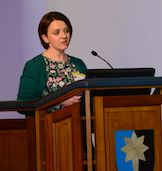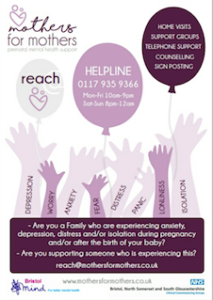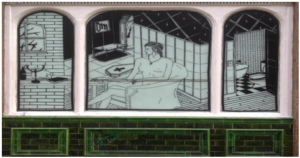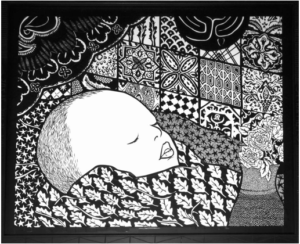Please read the Disclaimer before reading an article/ content on the website
About the author
IFWIP is honoured to publish this honest, brave and inspirational account of the life journey of Maria Viner. Maria is from the United Kingdom and the Director/ Chair of Trustees of Mother for Mothers.
This article has been written by Maria herself and supported by the Charity, Mothers for Mothers and the inspiring art-works are by Benjamin Murphy.
Talking about one’s own personal experience and sharing with others could be very challenging. On behalf of the IFWIP team, we would like to thank and commend Maria’s tireless work in raising awareness of Perinatal Mental health conditions.
We hope that this would help to reduce the stigma and shame attached to this health condition and encourage mothers (and families) to speak out and seek help early.
This would also help healthcare professionals to learn and develop/ improve family-centered care pathways around the world.

‘The Blogless Mother’
By- Maria Viner
How it began
Almost a decade ago I suffered and recovered from Postnatal Illness (PNI).
These days there are so many amazing women writing blogs and doing vlogs throughout their illness and recovery, which inspire and help so many others. I am in awe of these incredibly brave and honest women.
I have never been a blogger nor am I a wordsmith but I will endeavour to walk you through my PNI journey and if my tale sometimes seems messy, that might give you an insight into how it all felt.
In fact during my illness writing a two-line text was often way beyond my ability. I am dyslexic and my ability to read and write was further impeded.
But in truth, I hid my illness from almost everyone close to me due to the stigma associated with maternal mental health but also due to the fact I could not understand what was wrong with me and why I was unable to be like all the other Mums out there. I felt tremendously guilty and ashamed of myself.
William
Like many other women, my journey into Motherhood was not straightforward. I had a number of early miscarriages before becoming pregnant with my first son.
I had a wonderful pregnancy with him, I felt happy and healthy, I enjoyed every minute and excitedly planned a perfect home birth. At 11 days overdue I walked up a hill in the snow to the hospital for a wellbeing scan. Naively I did not take a hospital bag with me as I did not intend to stay to give birth. Later that day I was induced and after 19 hours William was born by forceps in theatre, a very different birth experience to the one I had hoped for. But he was here, I was happy and I fell immediately in love with him. He cried and was then rushed to NICU.
24 hours later he died in my arms.
The care and compassion my husband and I received in hospital following William’s death were of a gold standard. We were given time and space to create real and lasting memories and gently guided through the process by PEOPLE who I will remember for all my life. Following William’s death, I obviously went through a period of intense grief. Part of those feelings encompassed the fact I was a Mum – but I was not seen as a Mum because I did not have my baby. I don’t intend to cause any offence by skirting over William’s death … it was the most heartbreaking time of my life but those details are another part of our story.
I found my way to cope and I could understand why I felt so low, it made sense to me, my baby was dead, I was allowed to be sad. My husband and I were grieving together, we picked each other up, held each other and gave each other the strength to carry on. He was ready to try for another baby before me but he waited patiently until I got there. We knew we could never replace William but we desperately wanted to be parents again.
Joel
I was lucky to become pregnant again but this time I was extremely anxious during the whole pregnancy. I had a bleed at 8 weeks which I never really recovered from in terms of my anxiety. At no stage was I able to believe that the end result would be bringing a live baby home. I found it impossible to relax or have any hopes and dreams for the future. During this pregnancy, my Father in law died and he was buried beside my son, William. This formal visit to William’s graveside brought about a huge resurgence of grief for me.
My second son, Joel, was born by elective section at 38 weeks. He had reflux and lost weight quickly.
I was in the hospital for over a week with him and it was during this time my anxiety turned to withdrawal and depression. It happened very quickly. My husband was shocked by the speed of my downturn but he thought that once I got home with the baby all would be well. I did not manage to sleep very much.
It took me by surprise how much Joel looked like his brother and in the wee small hours, with lack of sleep making me feel almost as if I was hallucinating, sometimes I was not sure if this baby was real, or if it was all a dream.
When we went home I continued to have difficulties breastfeeding Joel because of his reflux. But I could not give up because I could not fail as a Mother again by not breastfeeding successfully. I’d already failed so much as a Mother, this time I HAD to do things properly. My anxiety grew and I could not believe Joel was here to stay. At any point, I thought someone would arrive to take him away. I continued to feel I was an imposter pretending to be a Mum, I could not fit in with all those other real Mums out there doing it properly. My local area began to feel hostile and unwelcoming, I did not feel safe. I began to become agoraphobic and on occasions, I had panic attacks. This led to me becoming socially isolated and even more lonely.
This is where I started packing and unpacking bags. At this stage, it was not too intrusive, but it sowed the seeds for something that was to become overpowering.
Eventually, I sought help from a local PNI charity. I told them I was isolated, I was too ashamed and embarrassed of myself I could not admit the truth. In reality, I was suffering from depression, disrupted sleep, appetite disturbance, exhaustion, tension headaches, skin problems, loss of libido, anxiety, panic attacks and hair loss.
This little charity, called Mothers for Mothers, was to become my refuge. It became my place of safety within my own community, in a world in which I felt I could not function. It became my lifeline and I credit them with saving my life and getting me through the suicidal thoughts that plagued me.

Through this peer support, I made friends for life. The activities and trips gave me a huge sense of relief that I was doing something normal and fun with Joel and this was far easier to do with a group of women who understood how I felt.
Trinity
When Joel was 6 months old we decided to try for another baby. I was still ill and I was terrified of being pregnant again but if we did not do it quickly I did not think I would ever have the courage. We tried unsuccessfully for 1 year. The heartache of the two-week wait followed by a negative test and the start of my cycle added to my depression. Blood tests showed I was peri-menopausal and we were referred to a fertility clinic. As we were going through the various tests I decided to stop breastfeeding Joel when he was 20 months. I fell pregnant that month — who knew?
Again I was extremely anxious during this pregnancy but this time I was also depressed and I had a toddler to care for who I felt I was letting down by not being a good enough Mum. He deserved so much better than me.
When I was 6 months pregnant my own Dad died. Due to my anxiety and depression, I did not have emotional space to grieve for him properly and so this was another layer of guilt to carry around. The intrusive thoughts that whenever I was pregnant someone died became very troubling.
But this time I did have more hope – I had expectations: If I was lucky enough to have another baby that lived, the Post Natal Illness could never be as bad because this time I would know what to expect. I would know the signs and I already had help and support in place – little did I know!
The day after what would have been my Dad’s birthday, Trinity was born by elective c section at 39 weeks. The birth was traumatic. My epidural did not work properly. I was in extreme pain and I felt very alone in the theatre. The pain was so bad I did not want to hold her.
Following her birth, it was discovered that Trinity had a PFO and she underwent tests in NICU. This hit me like a brick wall. I could not look at her – if I looked at her I would love her – if I loved her she would die. I did not see a healthy baby who needed some additional support, I saw my time in NICU with William.
We did not bond and I had terrible trouble feeding her. I would not give up breastfeeding because I could not fail! I’d failed too many times at being a good Mum before.
When I eventually took Trinity home, she would feed all day long. When she slept I would fall asleep while expressing another feed. She found it very difficult to latch on and I also had a toddler with IBS who I was toilet training. Every time she would be feeding comfortably he would need me for potty duty. I was a prisoner in the house. I resented my new baby because she stopped me spending time with my much longed for and dearly loved the son.
I have hardly any memories of the first year of Trinity’s life, every day was a struggle and there was no joy. I lost interest and enjoyment in everything. I was tearful, anxious, irritable, angry. I felt helpless, hopeless, lacking in energy and often confused. I began to have difficulties with my memory and poor concentration. I was unable to make decisions and my self- esteem was non-existent.
I was troubled with obsessive thoughts and had increasing difficulty communicating and engaging with other Mums. My relationship with my husband, my family, and my friends deteriorated and I thought everyone was “against” me. The isolation and loneliness became overwhelming, like a heavyweight engulfing me, I was drowning in it, holding on by my fingertips and often I just wanted to let go and float away in the hope I could be with William again.
I thought I was a BAD mum but I was obsessed with being a good Mum. I was overwhelmed with guilt about how bad I really was and I was too ashamed, to be honest about it. I believed that my family would be better off without me and I was the problem. At my lowest point, I would constantly pack and unpack bags. This was intrusive to the point it began to affect my ability to parent. On one occasion I stopped the car on the motorway to unpack and repack my bag. I had no control over the urge to do this and the danger I was putting my children and others in did not hit me until after the event. This was the beginnings of suicidal thoughts and plans, the world would be a better place without me and my children would be safer.
The reality of my PNI
People say treasure every moment when your children are small. The reality of my PNI is that I can’t remember more than a handful of moments of my daughters first year. I remember terrible cramp in my leg after her delivery. I remember sitting in the family room outside of NICU while she was scanned. Everything else is less than a haze.
I have no idea what we did on her first Christmas Day, who we saw, what Santa brought for her, did I even shop for her presents? I don’t recognise the woman with her in photographs. The woman who looked after my darling girl for a whole year. Did she love her like I do? There must have been moments of joy but she won’t share them with me and I have missed so much.
This is the reality of my PNI.
I have no recollection of her baptism. Was I really there? Did I chose her dress? Did I chose the roses? Did I speak to anyone? Were my friends there? Did we have fun? Did we laugh and joke? I can’t remember her first word, I can’t remember her first tooth, I can’t remember her first steps, I can’t remember what she liked to eat or what she threw on the floor in disgust!
So many memories lost …
As Trinity grew she developed some other health problems and our relationship continued to be difficult due to our lack of bonding. I had not experienced any problems playing with Joel, in fact, I had loved this time with him, but I had no idea how to play or engage with Trinity.
I was obsessed with doing everything right. I would not dream of leaving the house without everything they might need for every eventuality, however, I would never have a drink or snack for myself. I did slowly begin to learn to appreciate being a Mum and to enjoy time with my children. With the benefit of hindsight, I can see that I was meeting my children’s needs but meeting none of my own.
Feeling low and depressed had made sense when William died, but the overwhelming feelings of anxiety and depression when I had two live babies to care for made no sense at all. During my illness it had been my choice not to take the route of medication because I was always searching for clarity, I had a need to understand what was happening to me. I also felt that I deserved to feel as bad as I did and I didn’t deserve any help. It was my own fault I was a bad mother. Maybe if I had good information about medication, my journey may not have been so tough and I may have recovered more swiftly. I have great respect for all women who sail these PNI seas, whatever their treatment choices, there are no easy options.
New beginnings
I had my first lucid thought on holiday a week after Trinity’s first birthday, coincidental she had just given up breastfeeding by her own choice.
The children were playing in the breaking waves on the edge of the sea and I could hear them squealing with delight in the way only young children do. It was a magical sound and it was like my sense of hearing had woken up after being dulled for so long. I could not remember hearing them both laugh before. I looked at them and thought about how lucky I was, how beautiful they both were and my heart felt as if it were literally overflowing with love for them. It was the very first time I had that rush of unconditional love for Trinity. That feeling of love stopped the intrusive thoughts that had been on my mind throughout my motherhood.
From that moment onwards I promised myself I would recover. I have lovely happy memories of Trini’s second year and by her second Birthday, I felt well enough to return to work after five years of illness.
Finding the cherry to put on the top of my recovery cake
During my recovery, I still had one piece of the jigsaw missing. I couldn’t make sense of what had happened and my emotional responses. I stumbled upon the most beautiful, intricate, clever piece of art and everything suddenly made sense. electrical tape on the glass by Benjamin Murphy, on a building in Shoreditch.

It spoke to me on another level that made me realise I had not just been carrying around my grief for William in the tiny coffin by my side but I had also been carrying around all of my dead dreams about the amazing Mother I had thought I would be. From my expected home birth, to effortlessly feeding in a sling whilst doing lots of other wonderful things with my perfect babies and all the charming friends we would make.
I had expected to slip into the perfect Mother role with ease and to enjoy every second. I had wanted my husband to be proud of me and to be undisturbed by the practicalities of night feeds and nappies. I had believed that my children would be perfectly well behaved and if they were not one glance from me and they would become little darlings again.
All these dead hopes, dreams and expectations together with my grief for William, my father –in –law and my Dad, my grief for the person I used to be who I had completely lost in the process, were all packed in this tiny coffin that never left my side. This impacted on me every day.
I needed to say goodbye to it and to move on to the next stage of my life with my two fabulous children at my side and the memory of their brother cherished in my heart.
At last, I had my clarity, my recovery was complete. Art can allow us to make sense of such intense emotions that our conscious mind attempts to protect us from. The good news is it is possible to make a full recovery from a perinatal mental illness. Like many people sometimes I have moments of anxiety and sadness. Sometimes a moment of grief about what should have been with William takes me by surprise. When I look at this picture everything makes sense again. I’m very grateful to Benjamin Murphy for the part his work played in my recovery and his gift to me of this wonderful piece of art which continues to protect my mental wellbeing. I’m in awe of such a talent that can have such a profound capacity to allow people to heal.
And finally, I am not alone. I met other amazing women who were also suffering from perinatal illness. These women continue to inspire me in the work I do. We are in union, and we not only look out for each other but we look out for the next generation of women who may need our support, and we provide that support in union together. Our children’s lives have been enriched by our experiences and they have become emotionally mature. I salute you all and pay my respect to your individual journeys which you share so selflessly.
My story finishes where it began, with a gift, my inspiration and my motivation, a tiny life to honour, surrounded by a Mother’s love.

On behalf of the IFWIP team, we would like to thank Maria for kindly sharing her story and wish her and her family all the best for the future.
Please read the Disclaimer before reading an article/ content on the website

